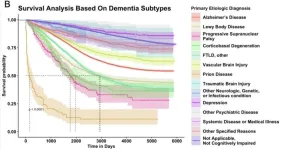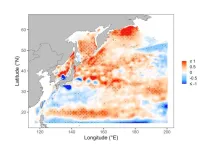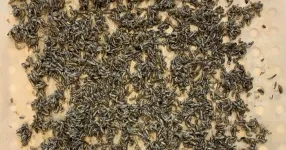Rheumatoid arthritis is associated with increased risk of cardiovascular disease, but it can be challenging to predict which individuals are at highest risk. Mass General Brigham experts in rheumatology and cardiovascular disease worked together to identify six biomarkers found in blood samples that can predict future risk of arterial inflammation among patients with rheumatoid arthritis. The team is now working to test these biomarkers in a larger and more long-term cohort of patients with rheumatoid arthritis. Rheumatoid arthritis impacts approximately 2 million people in the United States and is associated with increased risk of cardiovascular disease. However, assessing cardiovascular risk is difficult in patients with rheumatoid arthritis because standard clinical assessments based on factors like age, cholesterol, and smoking status tend to underestimate cardiovascular risk in individuals with rheumatoid arthritis.
In a new study published in the Journal of the American Heart Association, a research team led by physicians at Mass General Brigham with expertise in rheumatology and cardiovascular disease identified six blood biomarkers that are associated with cardiovascular risk in patients with rheumatoid arthritis and whose measurements improved the researchers’ ability to predict a future increase in arterial inflammation. The biomarkers hold the potential to clinically assess an individual patient’s risk of cardiovascular disease, but more research is needed to determine whether they are associated with cardiovascular events such as heart attack or stroke.
“We think these biomarkers might improve our ability to predict risk and intervene early to help our patients,” said first author Daniel H. Solomon, MD, MPH, chief of the Section of Clinical Sciences in the Division of Rheumatology and Matthew H. Liang Distinguished Chair at Brigham and Women’s Hospital, a founding member of the Mass General Brigham healthcare system. “The idea is that if we measure biomarkers that are specific to rheumatoid arthritis, we might be able to better identify those at highest risk of cardiovascular events.”
To identify rheumatoid arthritis-specific biomarkers of cardiovascular risk, the researchers assembled a panel of 24 candidate biomarkers that had been previously shown to be associated with rheumatoid arthritis and systemic inflammation. Then, they measured the concentration of these biomarkers in 109 patients with rheumatoid arthritis who were taking part in a randomized clinical trial (the TARGET Trial) to compare the efficacy of two different treatments for rheumatoid arthritis at preventing cardiovascular disease. The researchers measured the biomarkers at the beginning of the study and six months later, imaging the patients’ arteries at each time to assess their arterial inflammation—an indicator of cardiovascular risk.
“Arterial inflammation can predict future cardiovascular disease risk,” said cardiologist and co-author Ahmed Tawakol, MD, the director of Nuclear Cardiology and co-director of the Cardiovascular Imaging Research Center at Massachusetts General Hospital, a founding member of the Mass General Brigham healthcare system. “If you take a snapshot of a person's blood vessels, the more inflammation that is measured there, the greater the likelihood the person will have progression of their disease, and the greater likelihood that they will have a stroke or a myocardial infarction.”
Six of the 24 biomarkers were associated with increased cardiovascular risk and using them in predictive models improved the researchers’ ability to predict increases in arterial inflammation compared to standard clinical indices such as the Framingham Risk Score, which is based on factors such as age, sex, cholesterol, blood pressure, diabetes, and smoking.
“This is an important step towards using blood samples to measure changes in cardiovascular risk with the treatment of rheumatoid arthritis,” said Solomon.
The study showcases the strength of ongoing collaborations between Brigham and Women’s Hospital and Massachusetts General Hospital, said Solomon and Tawakol, who trained together as residents at the Brigham around 30 years ago. “Having two really great institutions collaborating in the same organization meant we could leverage the strengths of the respective institutions and teams,” said Solomon.
Now, the team is working to test these biomarkers in a larger and more long-term cohort of rheumatoid arthritis patients, the Brigham and Women’s Rheumatoid Arthritis Sequential Study (BRASS), which has been following over 1,000 patients with rheumatoid arthritis since 2003. This follow-up study will allow the researchers to not only test associations between the biomarkers and arterial inflammation, but also assess whether the biomarkers can predict future cardiovascular events such as heart attack or stroke.
Authorship: Additional Mass General Brigham authors include Olga Demler (BWH), Pamela M. Rist (BWH), Leah Santacroce (BWH), and Katherine P. Liao (BWH). Other authors include Jon T. Giles and Joan M. Bathon.
Disclosures: Solomon receives salary support from research contracts to Brigham and Women’s Hospital from CorEvitas, Janssen, Moderna, and Novartis. He also receives royalty payments from UpToDate on unrelated topics. Rist received salary support from research grants to Brigham and Women’s Hospital from Bristol-Myers-Squibb and the American Heart Association and has received honoraria from the American Heart Association for editorial work. Liao receives royalty payments from UpToDate and has consulted for UCB.
Funding: This work was funded by the National Institutes of Health (RO1 HL163580, R21HL167173, 5K01HL135342), the American Heart Association (17IGMV33860009) and the Foundation for the NIH Biomarkers Consortium.
Paper cited: Solomon, DH et al. “Biomarkers of Cardiovascular Risk in Patients with Rheumatoid Arthritis: Results from the TARGET Trial” Journal of the American Heart Association DOI: 10.1161/JAHA.123.032095.
###
About Mass General Brigham
Mass General Brigham is an integrated academic health care system, uniting great minds to solve the hardest problems in medicine for our communities and the world. Mass General Brigham connects a full continuum of care across a system of academic medical centers, community and specialty hospitals, a health insurance plan, physician networks, community health centers, home care, and long-term care services. Mass General Brigham is a nonprofit organization committed to patient care, research, teaching, and service to the community. In addition, Mass General Brigham is one of the nation’s leading biomedical research organizations with several Harvard Medical School teaching hospitals. For more information, please visit massgeneralbrigham.org.
END





